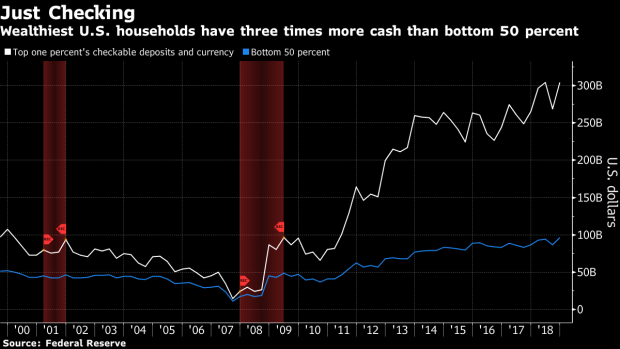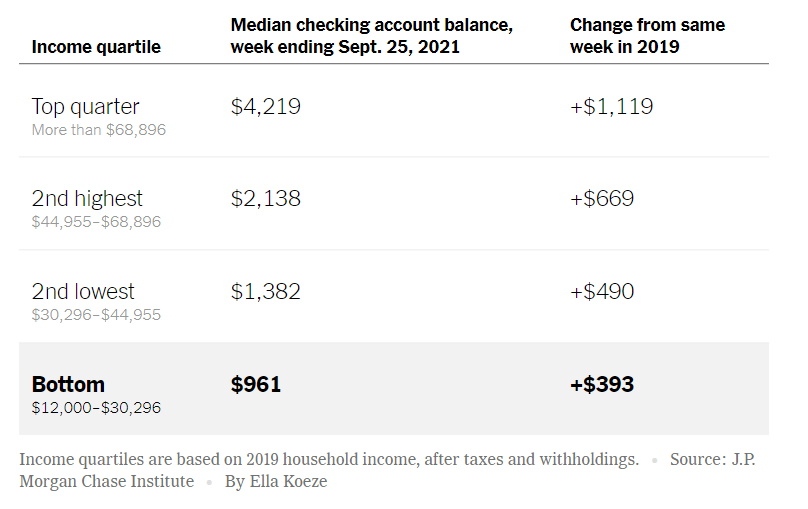The primary purpose to hold cash in your savings account is to bolster against emergencies and unexpected expenses. In other words, a cash storage acts as an emergency fund. However, holding too much of your portfolio as cash – as opposed to investing in the stock market, for example – means that you are both disproportionately exposed to the dangers of inflation and not optimally employing your capital for investment.
So, the logical question is just how much you should have in savings to create a balance between preparing for financial emergencies and engaging in optimal financial planning.
Contents
- How Much Cash Should I Keep in Savings and Where to Keep It
- How Much Should You Have In Savings?
- How to Decide How Much to Save?
- How to Create an Emergency Fund?
- How Much Cash Should I Have in my Checking Account?
- How Much Cash Should I Have in my Savings Account?
- How Much Cash Do The Wealthy Have on Hand?
- How Much Cash Should I Keep At Home?
- How Much Cash Should I Have in My Investment Portfolio?
- Wrap Up
This article may contain affiliate links which means that – at zero cost to you – I might earn a commission if you sign up or buy through the affiliate link.
I don’t have an account with Betterment and am not being paid to write about the Betterment Cash Reserve Account account.**
How Much Cash Should I Keep in Savings and Where to Keep It
The standard “financial professional” answer to the question, “How much savings should I have on-hand?” is “roughly six to nine months of living expenses.” However, this answer is often without much basis and ignores personal differences. When you think more deeply about this answer, you’ll find it’s a bit overkill to have $10k+ just sitting in your savings account.
Instead, think of the purpose of your emergency fund: It’s to account for unexpected expenses without having to take out loans, dip into your retirement savings, or sell investments. Thus, if you lose your job – for example – you’ll have a personal safety net with which to fund your living expenses while you get back on your feet – all without interfering with your debt status, retirement accounts, and investment goals. This is why the answer is so personal: Only you know how much cash you would need to fund your living expenses for that downtime.
As for where to store your emergency funds, you needn’t default to checking accounts, as you’ll be ravaged by inflation. At the very least, you should consider methods that offer at least a little resistance against inflation via somewhat decent interest rates. Consider the following places for your rainy day fund, where you can get a good yield on your cash:
- Certificate of deposit: This locks up your cash for a certain period of time but can be withdrawn early at a small penalty.
- Money market account: Essentially a savings account but with a better interest rate due to the way the money is invested on the back-end.
- High-yield savings account: As it sounds, it’s a savings account but with an institution that markets itself by offering higher interest rates.
How Much Should You Have In Savings?
Again, your emergency fund capital is a personal choice, but some rules-of-thumb can help you. The least amount of cash to have in savings is three months of living expenses. This is a minimal rule-of-thumb, as the Covid Pandemic has shown; many people had to fund living expenses with the stimulus checks the government distributed during the pandemic.
In a declining market environment, you don’t want to be in a position where you need to sell stocks and other investments as investment prices drop, to shore up cash for unexpected expenses.
Ultimately, the amount of emergency cash you need is an issue of practicality and psychology. Investment advice would push you toward, diverting more of your cash to investments. But the average investor is conservative and more comfortable with greater cash reserves. Still others prefer to deal with unanticipated expenses via borrowing and thus do not really require a cash cushion.
Many robo-advisors like Wealthfront and M1 Finance offer low margin borrowing rates for their clients, and high yield cash accounts.
In the end, there is no magic number here. The three-month rule-of-thumb is good for less conservative investors and those with quick and easy ways to generate income like freelance workers. While six-to-nine months would be more suited for conservative investors or those who might have a more difficult time gaining new employment, after leaving a job. Just to get the process started, try setting aside at least one month’s expenses for a major emergency and grow your fund from there.
How to Decide How Much to Save?
Here is a quick-and-easy method for calculating how much liquid cash you should have.
Calculate your net worth. Before you can set your financial and savings goals, you need to know your current status. Add all your assets in your savings and checking accounts, money market accounts, high-yield savings accounts, stock market investments, and all other investment accounts, including your retirement accounts – 401k, IRA, and taxable brokerage account.
Calculate your monthly expenses. Your monthly expenses include your necessities (e.g., food and housing) and your discretionary costs (e.g., eating out and hobbies). You should also include the money you put into investing and saving into this calculation.
Determine intermediate expenses. These are expenses that are less frequent than monthly, including tax payments, house repairs, and personal events (e.g., vacations, weddings and baby showers).
You can use Personal Capital Tools or Quicken to keep track of your net worth, savings, spending, and investing.
Check out the free Personal Capital net worth calculator. Just link your accounts and the free software will do the rest.
As soon as you understand your current financial status, you can begin creating your financial plan. For virtually all individuals – regardless of your personal finance issues – keeping cash in an emergency fund should be a priority.
How to Create an Emergency Fund?
If you already allot physical cash to food and other necessities, then creating an emergency fund is as easy as adding one more allocation. Of course, that physical cash will go into savings accounts instead of your wallet, and you’ll need to do a little financial planning to free up that cash. But the process itself is simple, just divert some of your extra funds into a cash stash.
More specifically, consider the 50/30/20 budget rule:
- 50% to fixed costs. This includes daily living expenses: food, rent, and insurance – any cost that is not discretionary. You pay these fixed costs monthly.
- 30% to discretionary costs. This includes entertainment, clothing, hobbies, and eating out. These are costs that can be cut in the case of a financial shock.
- 20% to saving, investing, emergency fund, and intermediate goals. That is, any money that is not going to daily and regular spending goes toward either irregular spending (e.g., down payment on a house), longer-term financial goals (e.g., retirement), or your savings (e.g., your emergency fund).
The easiest way to implement this rule is to automate your spending, saving and investing.
Automating your finances helps you avoid deviating from your financial and savings goals. Consider setting up an automatic deposit into a savings and investing app or directly into your bank account.
Bonus: How To Save $10,000 In A Year Or Less
How Much Cash Should I Have in my Checking Account?
Because checking accounts do not typically earn interest, we recommend you keep the absolute minimum in this account, if possible. Each bank and credit union has a different minimum balance for a checking account, so check with your institution. Of course, if you rely on this checking account for expense-paying, keep whatever you need. Just know that the cash in your checking account is equivalent to physical money in terms of fighting inflation – i.e., it is a decaying asset and should be kept to a minimum, without risking overdrafts.
Many robo-advisors offer high yield cash accounts which include checking. You can automatically set up deposits and transfers when checking balances surpass your pre-set limit. Betterment’s goal-based saving and investing platform offers high yield cash accounts with checking, saving and crypto.
Betterment Cash Yield is 4.75%**
How Much Cash Should I Have in my Savings Account?
The answer comes back to understanding your expenses. Once you have calculated your monthly expenses, as above, multiply it by your chosen rule-of-thumb: three months for aggressive investors and those with ready access to cash; nine months for conservative investors and those in rigid employment industries; and anywhere in between if you’re somewhere between those two extremes. The resultant number should be the ideal amount of money in your emergency fund.
How Much Cash Do The Wealthy Have on Hand?
Prior to the pandemic, the wealthy began hoarding cash.

And this trend continued after the pandemic. My calculation is that the average checking account or liquid cash account of the top 1% is roughly $360,000. This is overkill and should not be a guideline for the average investor.
Instead, consider these checking account balances for American’s in various income groups:

Though savings accounts have increased amidst the global financial crisis, even the top quarter of earners have only a little over $4,000 in their checking accounts. This should be achievable for those in the other income groups in four to eight months if you can put aside $500 to $1,000 a month, putting you into the top quartile of savers. The higher 2021 checking account balances are a good sign, but it’s important to consider your own cash flow needs when deciding how much money to keep in checking.
How Much Cash Should I Keep At Home?
Keeping physical cash at home is risky due to possible loss or theft. However, having some cash around can be useful for emergencies. Still, cash in your home, whether in a safe or not, should not replace an emergency fund in a bank account, as the latter at least earns interest and is protected with FDIC insurance.
Still, it’s nice to have some cash at home for the rare emergency. For example, if you need urgent repairs at home (e.g., broken pump, AC not working, electrical issues), you can call anyone without needing to check whether they take card and without having to run to the ATM. You also might want some extra cash at home if you live in a tornado/hurricane/fire-prone area. Also, in the rare event in which there’s a run on the banks, you won’t need to join the fray.
Ultimately, cash is nice to have, but don’t store all your emergency funds at home.
How Much Cash Should I Have in My Investment Portfolio?
First thing’s first: Cash is not an investment. Cash is only important because of its liquidity and wide acceptance as payment. Cash should be held in your savings account as part of an emergency fund but should never be held as an investment (unless you’re investing against another currency, such as in forex investing).
The bottom line is that cash should not be idle unless it is a cash cushion for your current budget.
Wrap Up
Most investors dream of getting rich with their investments and forget the “boring” stuff, such as keeping money separate from your investment account in an emergency fund. Keeping cash reserves for an emergency doesn’t need to hurt your investments all that much, especially if you put them in liquid investment vehicles such as a money market account, certificate of deposit or short-term bond funds. During an extended down market, you’ll see your investments fall, not want to sell, and be happy that you have cash sitting on the sidelines.
Keeping some physical cash on hand is also often a good idea, considering withdrawing cash can be impossible if your account is locked or stolen. Personal finance reminds us to diversify, not just in investment vehicles but also where you place your wealth. As for cash, it’s all about security: A branch bank is nice to have for in person withdrawals and human contact; cash in your wallet is well-appreciated during a technology bubble crash or unexpected emergency.
Ultimately, financial experts will advise against cash, in general. But being prepared for worst-case scenarios like a national emergency or job loss requires cash reserves. Start your emergency fund today, and your biggest possible regret can only be “I never needed to use that cash.”
Compare that with the alternative of not having an emergency fund when you need it, and… well… I’m sure you can imagine countless hardships in such an event.
Check out our recommended Personal Capital Net Worth Calculator and Betterment’s high yield cash account:
Betterment Cash Yield is 4.75%**
Related
- Savings Tips For Renters – From Financial Pros
- 8 Savings Tips From Warren Buffett
- 51 Ways To Drastically Cut Expenses
- Basic Savings Strategies
- What Percent Of My Income Should I Save?
Disclosure: Please note that this article may contain affiliate links which means that – at zero cost to you – I might earn a commission if you sign up or buy through the affiliate link. That said, I never recommend anything I don’t personally believe is valuable.
Empower Advisors Corporation (“PCAC”) compensates Wealth Media, LLC. (“Company”) for new leads. Wealth Media is not an investment client of PCAC.
**The annual percentage yield (“APY”) on the deposit balances in Betterment Cash Reserve (“Cash Reserve”) represents the weighted average of the APY on deposit balances at the banks participating in Cash Reserve (the “Program Banks”). This APY is variable and subject to change daily. Deposit balances are not allocated equally among the participating Program Banks. A minimum deposit of $10 is required, but there is no minimum balance required to be maintained. The APY available to a customer may be lower if that customer designates a bank or banks as ineligible to receive deposits. APY applies only to Cash Reserve and does not apply to checking accounts held through Betterment Checking. Cash Reserve and Betterment Checking are separate offerings and are not linked accounts.
For Cash Reserve (“CR”), Betterment LLC only receives compensation from our program banks; Betterment LLC and Betterment Securities do not charge fees on your CR balance.


